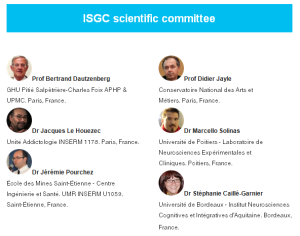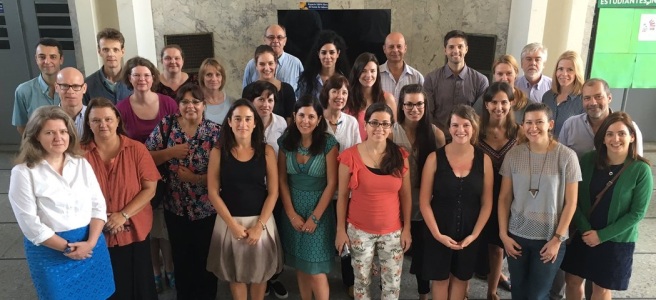On day two of the workshop we discussed interventions to reduce tobacco and alcohol use in pregnancy. Michael Ussher and Laura Lambi gave overviews of the situation in tobacco, and Sally Marlow and Gabriel Rossi described the situation as it stands for alcohol.
Interventions to reduce smoking include:
- Pharmacotherapy
- E-cigarettes
- Financial incentives
- Exercise
Each has varying levels of success, however exercise appears not to be effective for pregnant smokers as having to take additional exercise is often seen as an addition burden on women already struggling to adapt to being pregnant. No clear evidence on e-cigarettes in pregnancy exists to date but this is an important area for research in countries were they are available.
Psycho-social interventions include:
- Counselling
- Feedback
- Social support
- Health education
- Internet
- Telephone Quitlines
Again, each has varying levels of success, often depending on the context/country of delivery. The key message is that when interventions are combined (multiple) or tailored to specific groups, these are more likely to be effective.
Laura added that in Uruguay when interventions involve a group context these tend not to be popular, as it involves exposure to others, so we need to be determine whether interventions will be ‘culturally acceptable’.
Sally Marlow then gave some background into the topic of alcohol use and misuse. Alcohol use has been classified into 3 terms:
‘Hazardous drinking – the lowest end of the spectrum, and can be within ‘safe’ levels
‘Harmful drinking’ – this falls above safe levels, and can cause harm
‘Dependence’ – signifying addiction to alcohol, this is the most complex of the definitions.
It is important to realise that ‘alcohol use disorders’ does not just relate to consumption, but also patterns of drinking and the effect on a person’s life.
It is difficult to assess the levels of harmful drinking in pregnancy merely from the use of maternal self-report and study of animal models.
Gabriel Rossi then covered recent policy developments in Uruguay and explained a draft bill in 2008 with various alcohol control measures was not debated in parliament, partly or mostly due to industry lobbying. However, in 2016 the Presidential Commission will debate tax and advertising and the regulation of times when alcohol can be sold. Additionally, the Ministry of Health plans to introduce education campaigns on the dangers of excessive drinking.
In South America, consumption is highest in Argentina, Chile and Uruguay. In Uruguay, alcohol is a problem in youth, with a study showing that nearly 1 on 4 high school students had experienced intoxication in the previous 14 days, while the average age this group started drinking was 12.8 years of age. Alcohol remains the most popular drug in this group, followed by marijuana, energisers (energy drinks) and tobacco.
With regard to UK population-based interventions, Sally proceeded to summarise the recommendations from the University of Stirling and the Alcohol Health Alliances’ Health First (2013) report which examined evidence for population-based policies.
Poor progress has been made in current UK policy.
There has been resistance to minimum unit pricing, with pressure from the alcohol industry and the UK Government have backtracked on a pledge to introduce it. Scotland has made progress with reduced drinking limits for drivers but no change is expected in the other UK regions of England, Wales and N Ireland (although a private members bill is being considered in the House of Lords).
Funding for alcohol treatment services has been cut, and in some cases alcohol has been amalgamated into drug treatment services that may deter some potential users needing support.
The most relevant policies include:
1) Early identification of alcohol dependency and brief advice
2) Access to specialist alcohol services for those who need it.
However, ‘one size does not fit all’ applies here, as pregnant women vary in socio-economic status and other demographics, level of alcohol addiction and age, and it may require several interventions to effectively reduce alcohol use. Indeed, interventions may need to be different for each level of alcohol misuse – any, hazardous, harmful and dependency.
There is also the stigma of being known by medical services in fear of social services or similar agency removing the woman’s children.
New recommended safe drinking guidelines in the UK were introduced in January 2016, where pregnant women are advised to avoid alcohol completely.
The World Health Organisation have published guidelines on substance use in pregnancy, that includes alcohol, and for the prevention and management of tobacco use and second-hand smoke exposure in pregnancy. Linda Bauld and Fernando Althabe briefly described these guidelines, which have 18 and 9 recommendations respectively, with varying levels of evidence attached to each. These recommendations are highly applicable to implementation science.
The workshop participants were then split into four groups – two for alcohol, two for tobacco, where each presented an aspect of their work, followed by discussion, which was then relayed back to the whole group at the end of the day’s programme.
Post written by Graeme Docherty and Linda Bauld.
 “Great range of content and world-class speakers. Organisers did an amazing job including looking after us all while we were here. The mix of lectures / Q & As / panel discussions was great. Really worth taking time away from work/home to attend this.”
“Great range of content and world-class speakers. Organisers did an amazing job including looking after us all while we were here. The mix of lectures / Q & As / panel discussions was great. Really worth taking time away from work/home to attend this.” “Extremely informative course and relevant to current alcohol policy challenges. Good venue, convenient location and lovely setting. Module well organised and brilliant range of speakers.”
“Extremely informative course and relevant to current alcohol policy challenges. Good venue, convenient location and lovely setting. Module well organised and brilliant range of speakers.” “Thank you very much. It was a great privilege to listen and attend this course. Lectures and lecturers were outstanding.”
“Thank you very much. It was a great privilege to listen and attend this course. Lectures and lecturers were outstanding.” “Very informative useful training, well worth my time and travel.”
“Very informative useful training, well worth my time and travel.” “Wonderful networking opportunity.”
“Wonderful networking opportunity.” “Thank you for such a brilliant training event – the content was spot on, all the presentations and sessions were really, really good and I came away feeling that I had learned masses: a rich diet of fact and opinion. I can honestly say that I have rarely – if ever – enjoyed such an event quite as much as this one.”
“Thank you for such a brilliant training event – the content was spot on, all the presentations and sessions were really, really good and I came away feeling that I had learned masses: a rich diet of fact and opinion. I can honestly say that I have rarely – if ever – enjoyed such an event quite as much as this one.” 




















 Call for communications is open: Be part of the e-cig panel speakers : +60 oral communications will be selected from the call for papers. Submit your paper below!
Call for communications is open: Be part of the e-cig panel speakers : +60 oral communications will be selected from the call for papers. Submit your paper below!
